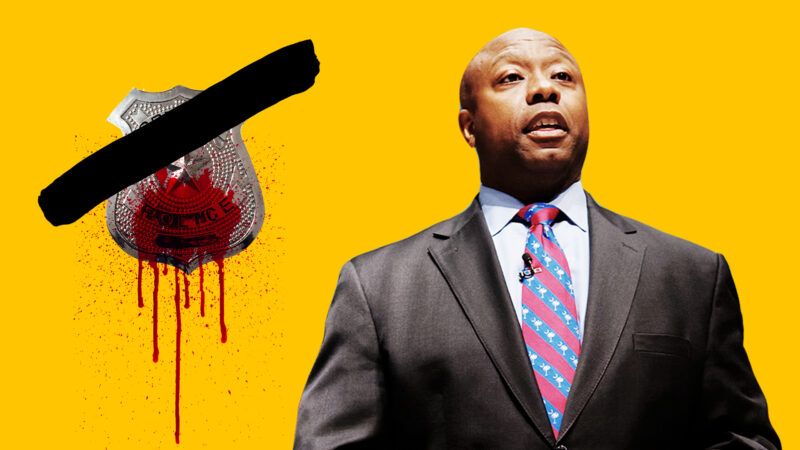Tim Scott Is Proposing a Major Reform to Qualified Immunity
The GOP has resisted reining in the doctrine. That might change.

Sen. Tim Scott (R–S.C.) has reportedly proposed a compromise to rein in qualified immunity, the legal doctrine that makes it difficult for victims to sue government officials when their constitutional rights have been violated.
Scott, who has served as the Republican leader on police reform talks, is suggesting that the doctrine be pulled back for law enforcement and that liability shift from individual cops to the departments that employ them. As of this writing, it was not immediately clear if the plan would curtail qualified immunity or outright eliminate it. (Qualified immunity protects all public officials, though this move would likely apply solely to police officers.)
Legislated into existence by the Supreme Court, qualified immunity currently requires that any misconduct alleged against state actors be outlined almost exactly in a previous court precedent should the victim want the right to bring his suit before a jury. Such a thing often doesn't exist. Qualified immunity has thus protected a cop who shot a 10-year-old, two cops who allegedly stole $225,000 while executing a search warrant, a cop who ruined a man's car during a bogus drug search, two cops who beat and arrested a man for standing outside his own house, and a cop who shot an unarmed 15-year-old, among others.
"[Democrats] have been as responsive in this recent conversation than they have ever been, in my opinion," Scott told CNN, noting that the discussion is "on the verge of wrapping soon."
Some progressives have pushed back on the idea, according to the network, instead insisting that individual officers be held accountable personally. That's misguided. As I've previously written, police departments already finance the vast majority of payouts when a police officer is not granted qualified immunity and subsequently loses a lawsuit in his or her professional capacity.
"Sen. Tim Scott's proposal—requiring the city to bear the costs of these suits, instead of officers—would make transparent what already happens in over 99 percent of cases," writes Joanna C. Schwartz, a professor of law at the University of California, Los Angeles and an expert in qualified immunity. "We absolutely need to find ways to increase officer accountability—by, for example, changing union protections that make it difficult to fire bad officers."
The GOP has historically resisted change on this issue. After the death of George Floyd sparked a national conversation on issues of police misbehavior and accountability, the issue of qualified immunity went from an obscure doctrine discussed in legal and academic circles to something the majority of the American public now supports reforming. Former Rep. Justin Amash (L–Mich.) unveiled a bill to eliminate the doctrine for all government officials and achieved tripartisan support—though with only one Republican co-sponsor.
Sen. Mike Braun (R–Ind.) introduced his own proposal to curb the doctrine, but withdrew it after Fox News host Tucker Carlson lambasted him for it and after the law enforcement lobby made its resistance known. Former President Donald Trump said that reform on the issue would've constituted an automatic veto, and Scott himself said last summer that it would have been a "poison pill."
But a few states have picked up the mantle where Congress has refused to act. The New York Times reports that legislators are studying reforms in Colorado, which passed a law last summer allowing people to bring claims against police officers in state court. New Mexico and Connecticut have greenlit similar pieces of legislation.
Virginia also mulled such reforms. Lawmakers eventually abandoned the idea after encountering opposition from a group of predictable dissenters: police unions.



Show Comments (48)